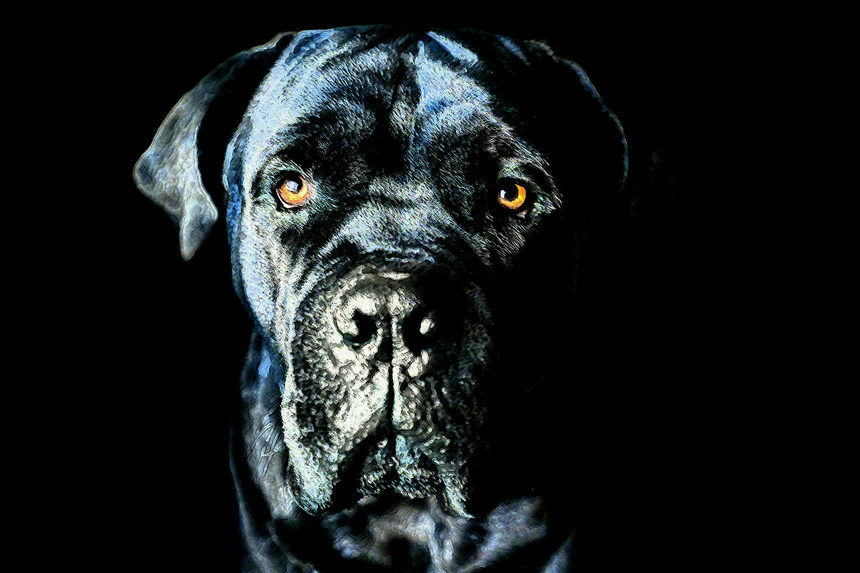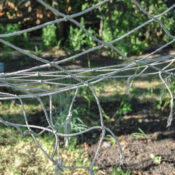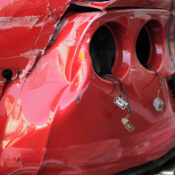Macy and Knox still trick-or-treat, but they’re too old to go after it hard, so they come back to Grandma’s to help hand out candy and, after the last group of little ones has gone with their buckets of sweets and the porch light’s out, all three sit down to cocoa and cake. Grandma’s phone keeps pinging. She’ll lift it from the table, watch for a moment, give a little chuckle or a wistful smile, and set it back.
“What is it?” Macy finally asks.
“Your father’s sad he can’t be here, so he’s been sending me Instagram reels all day.” The children see the little sparkling in her eyes, and just like that she’s losing it, using up her napkin on the streaming mascara.
How odd she is, so worried over a little thing like this. “I’m sure he’d have come if he possibly could,” Knox assures her.
“It isn’t that,” she says, waving off their concern. “It’s strange how even now, jaded as all of us are these days, those sorts of reels come up — the ‘man’s best friend’ reels come up, I mean — and I’m bawling.”
It’s getting late, time for stories, and so once she’s composed herself, she begins:
* * *
Blue wasn’t even my dog. He was my dad’s, and maybe that’s what made him seem so special. Because we saw it from the outside, how Dad would lean back in the recliner and Blue would come up and ask to sit in the recliner with him. He’d place his snoot on Dad’s arm and leave it there, eyes cast down. Almost a shame stance. The depth of his love expressed in shame.
He reminded you of those videos where the soldier comes home — or when the dog is saved from the shelter after having run away. Sometimes the dog makes an ass of itself, going all violent and screaming. Actually, that’s what most do, but sometimes they approach their returned person with disbelief, and they take a stance like they are guilty. Low shoulders, a tentative creeping motion. That’s how Blue approached Dad until he got the okay, and then he would pull himself up slowly, carefully, onto Dad’s chest, Dad would stroke him for a few minutes, and likelier than not, they’d both fall asleep.
That big dog would lie on his chest just inhaling Dad, like he lived off the scent of Dad. He would rarely lick, as though Dad were too holy to lick. Once in a while, he took a single, slow taste of the back of Dad’s arm.
He was a good all-around dog, too. Strong stomach, iron bladder. He did his business in the far corner of the yard and could be trusted to use the dog door, which none of our later dogs could be. They’d run out and act stupid, tear up the lawn, but not Blue.
I remember the first time Blue got lost. My little sister Mia or I had left the front door open by accident, and Mom came along and shut it without checking on the dog. Blue followed a stray up to the grocery store and caused quite a commotion, got taken to the pound and everything. Meanwhile, we didn’t even know he was gone. It wasn’t as though he was always underfoot. He liked to sun himself in the yard or curl up on the bed during the day.
Dad was the first to notice because Blue failed to meet him at the door with his customary smile and low howl. “Where’s my boy?” Dad said. “Little Boy Blue,” he called, with a happy, puzzled look on his face and proceeded to go from room to room, the smile fading.
“Probably in the yard,” Mom called.
“No, he would have said something,” Dad answered, and it was true. Blue would have jumped up on the fence.
We found him just a few hours later, that time. The next time, we weren’t so lucky.
We did what you’d expect. We searched, put up posters, kept calling the shelters. Nothing. It was the end of summer, and though we kept things up after school started, soon the urgency fell off. Dad was the first to say we should give up.
So on Halloween, I’d say he’d been gone about four months, which is just about right if you think about it.
I wake in the night to candy strewn over the coffee table thinking Now I know what grown-ups feel when they have a hangover. The red lamp’s still on, casting warm light over the tweed couch. My little sister’s pushing on my chest, whispering “Lacey, Lacey!”
“Okay, okay,” I say. It wouldn’t be so unusual for Dad to wake me up on the family room couch, but my Mia doing it is a whole other thing. When I sit up, I notice the candy and wrappers littered on the shag carpet.
“Why are you dressed?” I ask.
Mia’s got on her flowery windbreaker and her school backpack.
“We’ve got to look for Blue,” she says, and I groan. Somebody’s got to tell her. I’d wished it not to be me, but that’s too much to ask. The older sister is required to do pretty much every single thing.
“Let’s get to bed,” I say. I stand and put my hand on her shoulder. She’s looking up — I’ve never seen her so awake — saying, “I saw him. I swear.”
I missed him so bad last night. We’d let candy fall to the floor because there was no Blue to steal it. I remember how he used to sit, not begging but staring and hoping as we went through our bags, every other Halloween of my life.
How he would have barked and woken Mom and Dad if he’d caught us sneaking out now in the night. Mia thinks I’m brave enough for anything, but I am scared of stepping out the door long past a decent hour. Why do they call it “past a decent hour”? I wonder. Indecent things must happen after it.
After trick-or-treating hours, when the candy is gone or people are sick of handing it out, they turn off the porch lights, but then, before they go to sleep, they turn them on again. The lights are on now, so it’s very, very late. We walk tree-lined Brandywine Street. There are still hoots and music coming from behind us, east toward the college and downtown.
It’s strange to be out so late, but these are streets we’ve wandered so much, ever since Blue disappeared, that I feel fairly comfortable out here. We are walking west, which means we eventually run out of town and will find the canals and factories and overpasses that had been the focus of many searches.
We are quiet at first. Mia’s smart and knows that if we speak too close to home, we could rouse a dog and the dog could wake our parents. A fair distance from the house, I ask, “You saw him?”
“Yeah, on the sidewalk. I saw him on my way to get water, and before I could get to the door, he was gone. He was facing this way, is all I know.”
I suddenly realize I have on house slippers, grungy sweats, and a sweater-jacket too light for this night. There are people drinking beer on a porch step across the street. I feel sorry I left the house. “We should go back and wake Dad up,” I say.
“Naw,” she says. She’s too cool to say yes and no now. Soon she’ll be too cool for me.
But then she adds, “I don’t want to get Dad’s hopes up, in case we can’t catch him.”
So we keep on walking. Everything’s too vast to search, especially in the dark. I suppose we’re hoping Blue will wander up to us. It could happen.
There’s a group of teenagers coming, four or five, I can’t tell. In masks and loose dark clothes, strutting.
I hold my breath, reach for Mia’s hand, but she puts hers in her jacket pocket. I don’t know whether to yield or walk straight. I’m so often jumpy when someone approaches like this, but they separate into a group of two and a group of three. I catch a flash of a face under a sequined harlequin mask — pretty girl sucking on a lollipop the color of her lip gloss — and we are past. I don’t turn for a few more steps, and when I do, they are gone. Must have turned a corner.
“You saw them, didn’t you?” says Mia. “But you still don’t see him.”
“See who?” There’s no one, and out this far I no longer catch the sounds from downtown. The freeway would be loud at another hour, but just now it’s a little bit of white noise low enough we catch the distant tinkle of wind chimes on somebody’s porch.
“See who, Mia?”
“Blue.”
“I don’t think we’re going to find him.”
“Can you try?” she says. She’s crying.
I feel really, really insufficient for this. How could I have brought her out here? What’s wrong with me?
But we keep going, and as the streetlights become farther and farther apart, as the shadows deepen, I do start to see Blue walking on Mia’s side between the sidewalk and fences. He’s so, so faint and transparent, and then he comes clearer as the darkness grows. Soon it’s as though he is lit but nothing around him is. He is doing that slow, careful trudge he always did. His ass is high, giving him a leisurely bounce. He always reminded us of an elephant.
“Blue’s dead, Lacey,” Mia says.
“I know,” I breathe.
We are meant to follow him. We know that much — we’ve seen Lassie and read too many dog stories to be unsure on that point. Eventually there is more light over by the freeway, but he is still brighter than anything around. I can barely see through him to the graveled ground.
We follow him past the lighted place into a mess of briar and along a deserted concrete building. I hear a wide canal and smell it. Entering the building, we catch the first cries. Puppies.
This is why we’re here. We know it as soon as Mia turns her flashlight onto the rumpled nest of sacks. Three fawn-colored pups just waking and a blue one already standing, wobbling, his cries echoing through the empty space. Too small to go to their homes, I’m thinking from something I heard on TV, but if so, they can drink from bottles.
That was what Blue was thinking; that’s why he appeared: Save the puppies, take the blue one home to dad.
“Where’s their mother?” says Mia.
“I think she died too, don’t you?” I say. “Dogs aren’t like cats, you know. They don’t survive when they’re wild.”
“Is that true?” she asks. We’re kneeling, letting the puppies sniff us.
“I don’t know,” I say, taking a fawn one up to my chest. She’s already holding the blue one. They’re fat and have the good smell all puppies have. I think their mother must not have been gone very long at all.
I arrange two in Mia’s backpack. She tucks the blue one inside her jacket, and I hold my fawn one close under my sweater.
Blue’s still with us. Dim again, turned away. We weren’t looking at him for a while, and now it feels like he might disappear. We follow his gaze toward the open doorway with its slice of violet sky.
So suddenly we can’t brace for it, the mother comes all in a gust like a swarm of bees. We run toward the back wall, stunned, feeling this is the end, this is how we die. I trip on something, fall lightly. My fawn puppy is squirming hard, and when I turn, my field of vision is nothing but the mother’s face outlined huge in the air like a projection. Snarling, but sad too.
She must realize what’s happening. She must see her pups being saved because she draws herself backward through the air. She’s not as firm as Blue but she’s back with him now, the same size as him. Mia and I are crouched against the back wall, breathing hard. The two dogs look back at us. This is the first time I’ve seen Blue’s face. The two of them look sorrowful and spent. A minute of eye contact and then they move away toward the outdoors, going close, side by side. By the time they reach the doorway, we can’t see them anymore. Or I can’t, anyway.
It’s over.
Somehow it doesn’t feel over. Mia’s face still has that same strange alertness as we make our way through to the doorway.
Soon as we’re outside, a scary woman in a white witch costume swoops around toward us. “Whatcha doing?” she says. I can’t quite say if she’s like us or like Blue. It seems like she has more light on her than she should, but I can’t be sure.
“We’re going home,” Mia says, but she does not look certain.
The woman says, “You’re right on time for the parade.”
“We need to get back,” I say.
“A lot of people died in the city this year. You don’t want to see? Come on, come on.” She takes Mia’s hand and they move, side by side, into the bushes.
I stand alone for a moment. “Mia,” I call, but I have to follow.
“It’s special. You won’t see one this big again for a while,” says the woman.
All the panic of this night, but I haven’t felt quite so urgent until now. The bushes snag my sweater. Their foliage feels oily, filthy.
We break through, and there’s nothing but slow-flowing water. The woman’s between me and Mia, the lace of her costume absolutely ravaged by the trek.
“Oh my God,” says Mia.
I reach toward her, whispering, “We need to go.” My puppy’s sleeping, so warm and safe now, but still, we need to go.
We need to go before my eyes adjust, I think, but they’re already doing it. I’m already seeing.
Thousands of people wading in the canal, headed out of town — that’s all. We watch for a long time, shivering. A thousand people, and then more, and then they are all made of fog, and soon they are gone and it’s only the slow-moving water again. The light has changed. Clouds dissipated at some point leaving bright moonlight. Everything clear and real.
The woman is gone.
“We need to get them fed,” says Mia. She takes my hand.
I am bitterly cold, but her hand feels colder. On the walk home, we don’t speak. I can’t say if I see Blue walking between the sidewalk and the fences, or if that is only a wishful thought.
The puppies Mia carried in her backpack grew strong. We found them good homes around here. The fawn one I held so close that night became my own. I called her Fawn because I have no imagination, and she lived a long time. She lived with your grandpa and me in our first home and even met your dad when he was a little pup. A very sweet girl.
The blue pup never was as good as Blue. He had his problems, and something in Mia changed too. She became a grown-up right away as I recall. She grew up smart and tough, but there was some charm and openness she lost forever that night. She died young, as you know, and … it felt like she always knew that was going to happen. After that night, at least.
Maybe I changed too, I don’t know.
I’d say the look on Dad’s face when we woke him and showed him his puppy was worth all our trouble. I don’t recall what we told him — it couldn’t have been close to the truth — but he was so grateful. And he loved that puppy as much as he ever loved Blue, even with all of its problems. When it was grown, it wouldn’t even ask; it would jump right up on to him and lick his face before falling asleep on his chest.
There’s something about a reunion, even when it really isn’t one. Something about getting something you’d given up on ever having back.
He was a sweet man. I wish you two could have met him.
* * *
After the story, Grandma rinses the dishes. The children think she will tell them it’s time for bed, but instead she guides them toward the door. She tells them to get into their jackets and boots. “And mittens, and scarves,” she says. “It will get cold.”
The porchlights have gone back on. How could it have gotten so late? The night is still and warm, but yes, it will get cold out before this is done. Macy doesn’t seem to see the family dogs in the shadows, Blue and Fawn and all the rest, but something in Knox’s face suggests he does.
Grandma is wearing a tattered sweater-jacket. The children don’t remember her putting it on. She’s walking so quickly ahead of them that they have to hurry, moving with the loose and gangly gait of a huge newborn animal. They don’t like it, but they do not have time to talk, or think.
They hear the hooting and music from downtown, toward the east, but they head west on Brandywine toward the freeway.
“Why now?” Macy asks.
They expect her to say it’s a big parade this year, something they won’t have the chance to see again for quite a while, but Grandma doesn’t answer.
Become a Saturday Evening Post member and enjoy unlimited access. Subscribe now




Comments
Enjoyable story Ms. Nogle that blended the past with the present, with the dog at the center and focal point. I like the way you created the guided imagery of the dog between the sidewalk and the fences with illusions of light and dark depicting him as both real and a hologram ghost; just there long enough to guide the two girls where they needed to be.